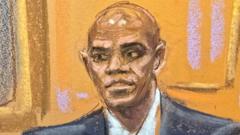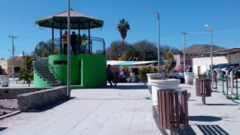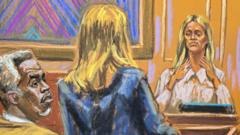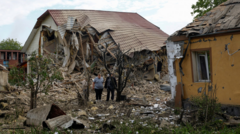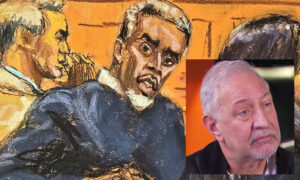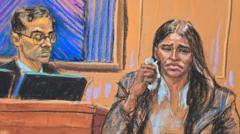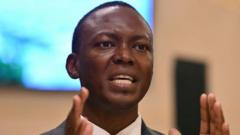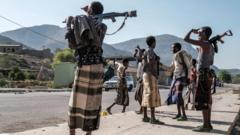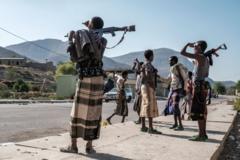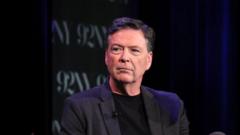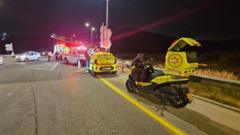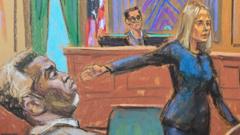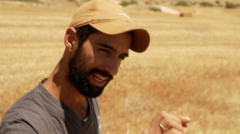In a significant political maneuver, the UK foreign office has announced sanctions against Daniella Weiss, an influential figure in Israel's settler movement, whose actions have reportedly exacerbated the ongoing violence against Palestinian communities.
UK Imposes Sanctions on Notorious Israeli Settler Daniella Weiss

UK Imposes Sanctions on Notorious Israeli Settler Daniella Weiss
The UK government targets far-right settler Daniella Weiss, amidst ongoing tensions in the Israeli-Palestinian conflict.
Daniella Weiss, dubbed the "godmother" of the Israeli settler movement, has been sanctioned by the UK government for her involvement in the establishment of settlements in the Israeli-occupied West Bank and East Jerusalem. The announcement, made by Foreign Secretary David Lammy, emphasizes the UK's commitment to holding those responsible for extremist actions accountable, particularly as Palestinian communities continue to experience intimidation and violence.
As a leader of the radical group Nachala, Weiss has played a pivotal role in founding various settlements since the late 1960s. The sanctions sheet highlights her active participation in a range of aggressive acts against Palestinians. In a statement addressing the sanctions, an Israeli foreign ministry representative labeled the UK's actions as "unjustified and regrettable," asserting that the move unfairly singles out individuals for their involvement in contentious political actions.
Weiss has garnered significant media attention, most recently featuring in a documentary by Louis Theroux, where she expressed her controversial views on Palestinians in Gaza. Following the UK's sanctions, she asserted that there are numerous families ready to settle in Gaza, emphasizing a desire for an increased Jewish presence in the region. Weiss's organization advocates for the continuation of military efforts until perceived enemies are eliminated.
In addition to Weiss, the sanctions encompass two other settlers and associated entities, including two illegally established outposts. Lammy reaffirmed the UK's stance, urging the Israeli government to prevent further acts of aggression which threaten the viability of Palestinian communities and the broader framework for a two-state solution.
Furthermore, the UK has temporarily paused free trade discussions with Israel, with Lammy stating that negotiations cannot proceed under the current Israeli policies in the region. In response, the Israeli government criticized the UK's approach, suggesting that it prioritizes anti-Israel sentiment over economic consequences.
These developments coincide with a joint statement from the UK, France, and Canada, urging Israel to cease military operations and facilitate humanitarian aid access to Gaza. While Israel has indicated a willingness to allow limited food supplies into the besieged territory, the UN has flagged that the proposed aid is insufficient to meet urgent needs.
As the situation continues to evolve, these sanctions and diplomatic engagements illustrate the complexities and ongoing challenges surrounding the Israeli-Palestinian conflict, highlighting the international community's attempts to address humanitarian crises and advocate for peace.
As a leader of the radical group Nachala, Weiss has played a pivotal role in founding various settlements since the late 1960s. The sanctions sheet highlights her active participation in a range of aggressive acts against Palestinians. In a statement addressing the sanctions, an Israeli foreign ministry representative labeled the UK's actions as "unjustified and regrettable," asserting that the move unfairly singles out individuals for their involvement in contentious political actions.
Weiss has garnered significant media attention, most recently featuring in a documentary by Louis Theroux, where she expressed her controversial views on Palestinians in Gaza. Following the UK's sanctions, she asserted that there are numerous families ready to settle in Gaza, emphasizing a desire for an increased Jewish presence in the region. Weiss's organization advocates for the continuation of military efforts until perceived enemies are eliminated.
In addition to Weiss, the sanctions encompass two other settlers and associated entities, including two illegally established outposts. Lammy reaffirmed the UK's stance, urging the Israeli government to prevent further acts of aggression which threaten the viability of Palestinian communities and the broader framework for a two-state solution.
Furthermore, the UK has temporarily paused free trade discussions with Israel, with Lammy stating that negotiations cannot proceed under the current Israeli policies in the region. In response, the Israeli government criticized the UK's approach, suggesting that it prioritizes anti-Israel sentiment over economic consequences.
These developments coincide with a joint statement from the UK, France, and Canada, urging Israel to cease military operations and facilitate humanitarian aid access to Gaza. While Israel has indicated a willingness to allow limited food supplies into the besieged territory, the UN has flagged that the proposed aid is insufficient to meet urgent needs.
As the situation continues to evolve, these sanctions and diplomatic engagements illustrate the complexities and ongoing challenges surrounding the Israeli-Palestinian conflict, highlighting the international community's attempts to address humanitarian crises and advocate for peace.

